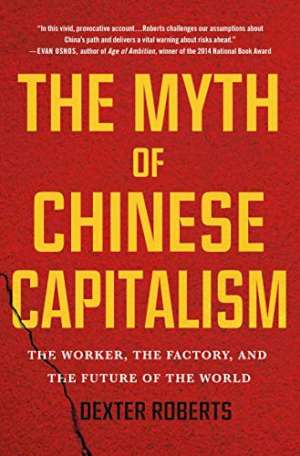15 July 2021
The Myth of Chinese Capitalism
Dexter Roberts
2020, St Martin's Press, 288 pages,
ISBN 9781250089373
Reviewer: Andrew Peaple

China’s growth grinds on remorselessly, the ravages of COVID-19 already seemingly well in the past. The concerns of several long-time observers of the country’s economy over its underlying health only seem to be growing, however. Dexter Roberts, a long-time Beijing bureau chief for Bloomberg Businessweek, falls squarely into the sceptic camp. In his book ‘The Myth of Chinese Capitalism’, he focuses on China’s still vast rural population, its role in fuelling the economic expansion of recent decades and the questions now around its future. Put simply, the issue facing Chinese policy makers is what these hundreds of millions of people are going to do if the country is to escape middle-income status, shift to a more sustainable economic structure and become ever more technologically advanced.
Under Mao, China’s rural dwellers provided cheap food for their urban counterparts who were supposedly spearheading the country’s industrialization. In the post-Mao reform era, that same population has been the source of cheap migrant labour, moving in droves to work for coastal exporters or on construction sites in major cities. But as Chinese manufacturers become less competitive thanks to rising costs and production shifts to the likes of Vietnam and Bangladesh, the question is what role such workers will play if the government is to achieve its goal of reorienting the economy more towards services and consumption, and away from investment and exports.
Roberts illustrates China’s rise and the dilemmas it now faces by focusing on the Mo family, from the perennially unfashionable southwestern province of Guizhou. It’s a technique commonly used by journalists, especially those writing their ‘China book’ after a stint in Beijing or Shanghai. The narrative device, however, works well in Roberts’ hands given his unusually long, more-than-two -decade commitment to reporting from China, and his consequent ability to keep returning to track the latest movements of the Mo family’s members.
This narrative in turn provides a valuable companion to another recent work currently creating a stir among China watchers: ‘Invisible China’, by Scott Rozelle and Natalie Hell, the product of many years of on-the-ground research into the country’s rural-urban divide. Indeed, Roberts cites Rozelle’s work, which has in particular exposed many of the myths around China’s education system. Along the way Roberts highlights other structural issues facing China and its vast horde of rural workers, such as its unfair land ownership rules and the rise of robotics. The manifest inequities of the ‘hukou’ household registration system, which leaves rural migrants to cities with little access to welfare and other benefits, are described in detail, as is the potential for exploitation of largely unprotected ‘gig’ workers, operating in industries such as food and parcel delivery. The ultimate impact of Roberts’ highly readable book, especially taken together with Rozelle’s work, could be to reorient our understanding of where the true vulnerabilities lie in China’s economic model.
Perhaps coloured by the Western experience of the global financial crisis, many observers have tended to focus on China’s massive debt pile and the possibility it will suffer its own banking system collapse. Roberts instead hones in on the deepening inequalities in China’s economy, warning of the social unrest this could cause if the unspoken compact between government and populace – rising living standards in return for restricted individual freedoms – breaks down. For sure, this may not lead to a particular moment of ‘crisis’, but instead a long period of stagnation and societal breakdown, kept in check only by an increasingly repressive government employing ‘Big Brother’-like methods of control. How this shakes out is likely to be the key story for China in the coming years. Perhaps sufficient faith in the Communist Party will linger, even if living standards stagnate or decline for the majority, buttressed by nationalistic sentiment and a general belief that ‘at least things are better than they used to be’. Perhaps enough of the wealth generated by China’s tech entrepreneurs and others will ‘trickle down’ to the broader population – although the experience of Western countries isn’t particularly encouraging here. The potential for things to swing the other way – that would turn out badly both for China and the world in general – is certainly there. Dexter Roberts’ book, then, should be taken as a timely warning.
